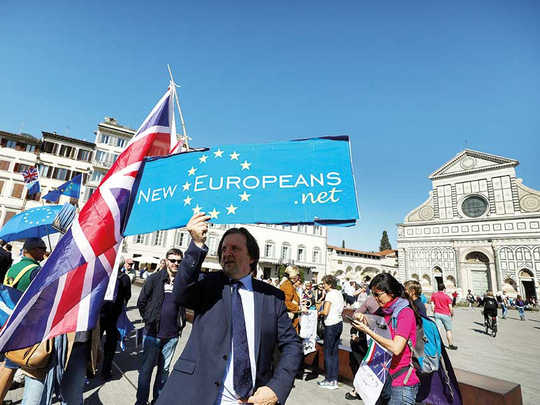
The European Union’s chief Brexit negotiator, Michel Barnier, welcomed the “constructive spirit” of Prime Minister Theresa May’s speech on Friday, but warned that her words need to be translated into concrete progress around the negotiating table.
While her speech in Florence shows “a willingness to move forward,” many of the UK’s positions on Brexit are still unclear, Barnier said in an emailed statement. On how much Britain is prepared to pay as part of the divorce, there is still much to work on, he wrote.
“The United Kingdom recognises that no member state will have to pay more or receive less because of Brexit,” Barnier said. “We stand ready to discuss the concrete implications of this pledge. We shall assess, on the basis of the commitments taken by the 28 member states, whether this assurance covers all commitments made by the United Kingdom as a member state of the European Union.”
In the speech, May said that the UK is prepared to plug the EU’s budget black hole during a transitional period that would probably be about two years after the country’s withdrawal from the bloc in 2019. This would equate to about 20 billion euros ($24 billion, Dh88 billion). But the EU wants more than that, possibly as much as another 80 billion euros in gross terms, to cover past commitments, and it’s unclear to EU negotiators whether May promised to pay for that.
‘Concrete implications’
“Our ambition is to find a rapid agreement on the conditions of the United Kingdom’s orderly withdrawal, as well as on a possible transition period,” Barnier said. “In any case, the future relationship will need to be based on a balance of rights and obligations.”
Talks resume in Brussels on Monday, with hope on both sides that May’s speech will at least have given some impetus to break the deadlock.
Both the EU and Britain had pencilled in a summit in October for the moment when EU leaders would give the green light for talks to move onto a future relationship. That needs “sufficient progress” on the financial settlement, the rights of EU nationals in the UK and British expats in the EU, and the Irish border.
“The sooner we reach an agreement on the principles of the orderly withdrawal in the different areas — and on the conditions of a possible transition period requested by the United Kingdom — the sooner we will be ready to engage in a constructive discussion on our future relationship,” Barnier said.
Governments around Europe echoed Barnier’s cautious welcome.
European affairs ministers from the bloc’s 27 remaining states will gather in Brussels on Monday to discuss May’s latest overtures. The same day, the UK’s Secretary of State for Exiting the European Union, David Davis will start the next round of negotiations with Barnier, which is scheduled to last until Thursday, while a final round of talks is foreseen before October’s EU Summit.
“It is unlikely there was enough in the speech to convince the EU to move on to the transition and future relationship,” John Springford, director of research at the Centre for European Reform in London, said. “Trust is at a low ebb, and the lack of specifics means that there will have to be more negotiations before the 27 will move on from the divorce to talk about the future.”











